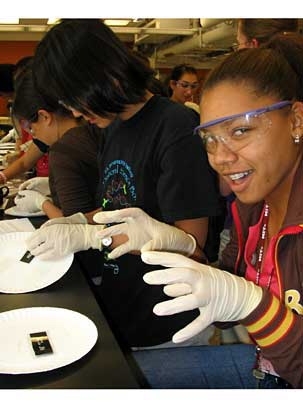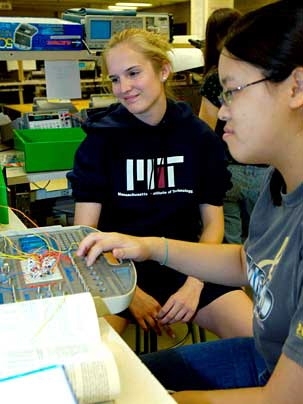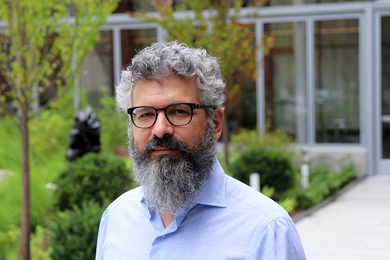When seniors Alisha Schor, Emily Slutsky and Kyung Jin Chang step to the stage to accept their S.B. degrees at the 141st Commencement ceremony on June 8, they will be among six seniors making history as the first members of MIT's Women's Technology Program (WTP) to graduate from the Institute.
It was only five short years ago, in the summer of 2002, that they initially arrived on campus to participate in the inaugural session of WTP, a four-week academic and residential experience where pre-college female students explore engineering through hands-on classes, labs, and team-based projects. At the time, having just finished their junior year in high school, these young women had trouble imagining themselves as students at MIT--let alone graduating with bachelor's degrees from the School of Engineering.
For Slutsky, the worry was that she wouldn't be capable of tackling the notoriously rigorous freshman curriculum or adjusting to a new "environment of intense intellectual expectations." Fortunately, though, before she had even decided which universities to apply to, "WTP made attending MIT a realistic option" for her by providing an early glimpse of what it's really like to be a student at the Institute.
"WTP was my first experience within a challenging, college setting," she said when asked how the program helped prepare her for the success she ultimately achieved as a nuclear science and engineering major. "The reward came from meeting the challenges placed before me. Throughout the month, I faced frustrations and insecurities so far beyond what I faced in high school. At the conclusion of the month, I was able to feel like I pushed my boundaries, that I took myself outside of my intellectual, as well as social, comfort zones and was made the stronger, the more confident, for it."
That feeling of personal empowerment that comes from exceeding one's own expectations is exactly what the program strives to promote among the students who participate. When WTP was proposed in 2001 by then-senior Doug Ricket (M.Eng. 2002), its goal was to encourage high school-age women to envision themselves in careers that are typically dominated by men.
Discouraged by "low number of female students and instructors" in the electrical engineering and computer science department at MIT, Ricket started WTP. He hired a team of MIT women, including graduate and undergraduate students, to help combat the erroneous but prevalent assumption many adolescent girls hold that they won't succeed as engineers. The students served not only as instructors and residential tutors for the electrical engineering, computer science and math classes that were offered that first summer but also as role models for teenagers who might be wondering whether or not they would "fit in" at the Institute.
And, as Schor attests with a smile, the plan worked for her: "WTP gave me comfort in accepting my admission here, because my main hesitation was that people would be 'too nerdy,' but the residential tutors I had were all great and mostly normal!" In fact, she confesses that it was a WTP instructor who inspired her to major in mechanical engineering as an undergraduate: "She told me that you get to build things in all of your MechE classes."
But over and above this "insider knowledge" she acquired from the program's staff, Schor says the best part of WTP was the camaraderie that developed among the participants themselves. "It was a great experience to work with people with the same academic desires and abilities as me, and to feed off of each other. Every group member was equally capable of generating new and creative solutions to problems and had the motivation to do so, which was different than my high school experience."
No doubt this enthusiasm for teamwork will serve her well in Tarragona, Spain, where she has taken a job with the Dow Chemical Corporation that starts in the fall--just after she spends one more summer in WTP, this time as a residential tutor for the program's new mechanical engineering track.
Although Slutsky will not be joining her WTP classmate Schor on staff (she'll be busy preparing to attend Georgetown University's master's program in health physics), she clearly believes in the benefits of the program: "I would recommend WTP to any woman who wants to spend a month evaluating her personal and intellectual comfort zones, and then challenging herself against high-reaching goals and aspirations that she had previously dismissed as unattainable. WTP is a woman's opportunity to develop, fine-tune and cultivate an invaluable confidence in herself."
To find out more about WTP please go to wtp.mit.edu.
A version of this article appeared in MIT Tech Talk on June 6, 2007 (download PDF).







